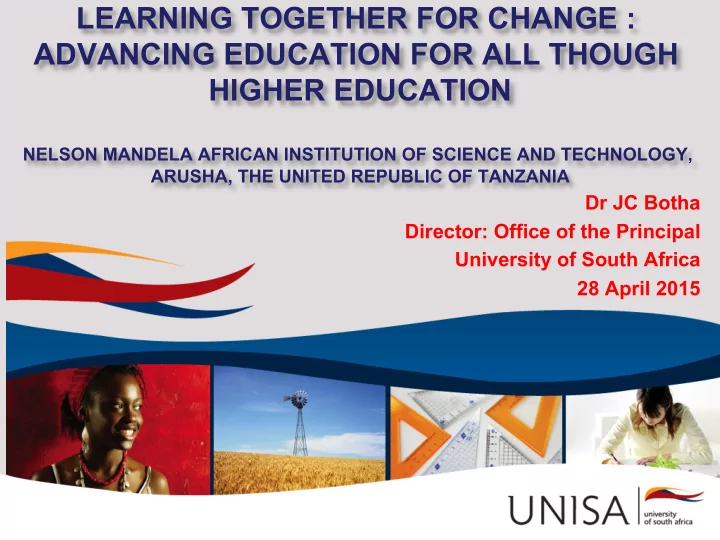

LEARNING TOGETHER FOR CHANGE : ADVANCING EDUCATION FOR ALL THOUGH HIGHER EDUCATION NELSON MANDELA AFRICAN INSTITUTION OF SCIENCE AND TECHNOLOGY, ARUSHA, THE UNITED REPUBLIC OF TANZANIA Dr JC Botha Director: Office of the Principal University of South Africa 28 April 2015
THE ADVANCEMENT OF TEACHING AND LEARNING IN HIGHER EDUCATION : THE IMPORTANCE OF QUALITY AND TECHNOLOGY IN DISTANCE EDUCATION • Introduction • Quality – Context – Challenges – Realities • ICTs – Context – Challenges – Trends – Realities • Conclusion and way forward
QUALITY Robert Pirsig, in his famous book entitled Zen and the Art of Motorcycle Maintenance (ZMM) expounds his ideas about the concept of Quality as follows: “ Quality … you know what it is, yet you don ‟ t know what it is. But that ‟ s self-contradictory. But some things are better than others, that is they have more quality, but when you try to say what quality is, apart from the things that have it, it all goes poof!...Obviously some things are better than others … but what ‟ s the “ betterness ” ?...What the hell is Quality? What is it? ” (ZMM, p184) The Australian Universities Agency (AUQA) favours a holistic fitness-for-purpose definition of quality over all others: “ The final definition, „quality equals fitness-for-purpose ‟ is one of the most commonly used in HE, and rightly so, because it subsumes all the rest ……… Taking quality as fitness-for-purpose means deciding on the desired emphasis whether it be threshold, excellence, transformation or value for money, and then „quality ‟ is „achieving this ‟ . ” (Woodhouse, David. (2009). Introduction to Quality Assurance, AUQA.) 3
QUALITY (2) • South Africa: Unisa ODeL is funded, quality assured, formal qualifications accredited : How does one define, ensure and assure quality in DE provision? • Faux accreditation – acknowledgement and uptake? • Limited/fragmented evidence of successful, quality-assured formal education on any kind of scale , and with any kind of formal accreditation. • Education vs. information : survival vs. edification – students need gainful employment, or do we perpetuate disadvantage? • Quality DE not cheap, but possible (Unisa signature courses) BUT challenging logistical and cultural considerations. • Can we confidently apply existing QA models to ODeL in a non- quality assured environment?
ICTs : " Reality is the murder of a beautiful theory by a gang of ugly facts."( ... Thomas Henry Huxley). • Extracting a balanced needs assessment from the seductive potential of ICTs in ODeL: altruism/fad/profiteering/hegemony “ It ’ s seductive: the notion that we could draw more students and contribute to our institution ’ s bottom line by simply moving our existing curriculum, classes, and faculty online lock, stock, and barrel … . But the online environment is fundamentally different and requires fundamentally different input to attain similar output. ” Morris, SM and Stommel, J. (2013). • New research emerging – greater balance • The element of time (Gartner ’ s Hype Cycle) • ODeL providers need inbuilt agility to adapt to a dynamic environment/ competition from private providers • The role of leadership, management, governance and the institutional culture in successful ODeL provision
CONCLUSION • Unisa Current ODeL delivery model • The contextual nature of quality assurance and the distinct and varying models of ODeL - time to create anew ? • Create or design a generic African quality assurance model, with continentally agreed principles /criteria that can be benchmarked globally and peer reviewed via existing continental ODeL structures and bodies for ODeL, using capacity and resource sharing. • Ensuring quality ODeL might gain greater traction where we have an African QA model developed by Africans, cognizant of our peculiar challenges and expressive of our conception of quality ODeL. • Could we align this to our various ODeL models?
"We are living through an extraordinary moment in human history. Historians will look back on our times, the 40-year span between 1980 and 2020, and classify it among the handful of historical moments when humans reorganized their entire civilization around a new tool, a new idea. These decades mark the transition from the Industrial Age, an era organized around the motor, to the Digital Age, an era defined by the microprocessor -- the brains within today's personal computer. The mid-1990s, perhaps even 1995, may come to be viewed as the defining moment when society recognized the enormity of the changes taking place and began to reorient itself. “ THANK YOU
Recommend
More recommend